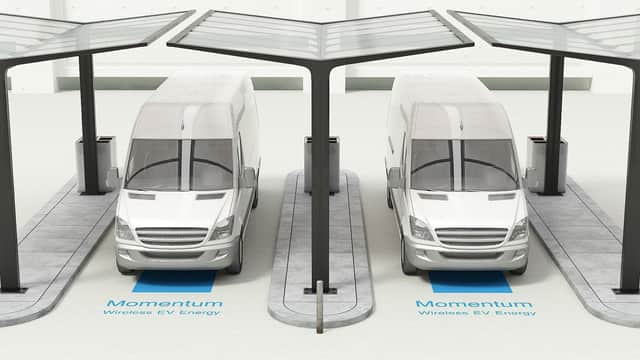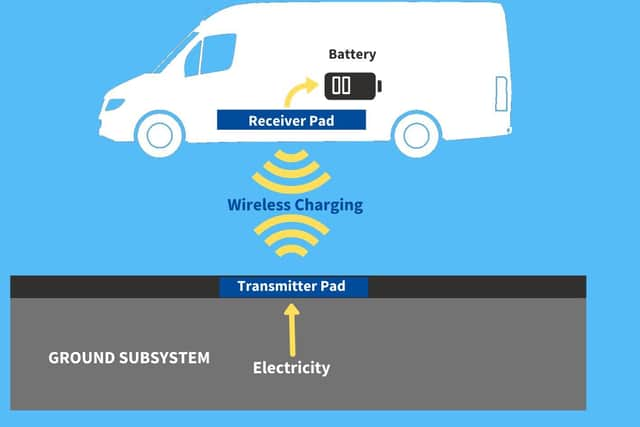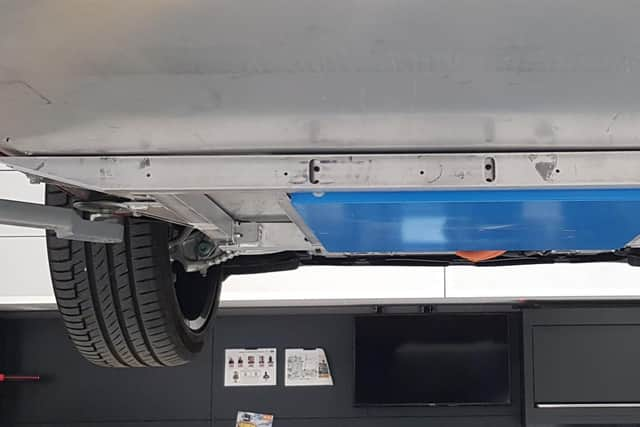UK-first wireless electric van charging trial at Heriot-Watt University


The technology enables batteries to be recharged without the need for cables, speeding up the process.
Vehicles are simply parked above charging pads, with a “receiver pad” attached to the bottom of the chassis sending power to the battery
Advertisement
Hide AdAdvertisement
Hide AdHeriot-Watt believes it could encourage more firms to use electric vehicles and cut emissons.


The equipment is also future proofed for potential use by autonomous vehicles which have no driver to plug in cables.
The university said wireless charging had already proved to work for buses, such as in Milton Keynes.
The joint project with the City of Edinburgh Council and Flexible Power Systems (FPS) is due to start in the spring.
It will involve specially-adapted university and council vans, with charging equipment from Momentum Dynamics.


The university said the project’s success could see van fleets across the UK using such chargers, which take 30-60 minutes to top up batteries.
Chargers could be deployed across the country, with companies such as delivery firms able to book time slots for their vehicles.
This could avert the need for vehicles to return to their depots to be recharged.
Advertisement
Hide AdAdvertisement
Hide AdFunding for the trial is from the UK Government’s Office for Low-Emission Vehicles through its innovation agency Innovation UK.
City council fleet manager Scott Millar said: “We are already deploying electric vehicles across our fleet and looking at ways we can drive adoption in the wider community.
"Providing charging infrastructure like shared hubs has the potential to play a key part of removing barriers to uptake for both the council and the community.
"We’re excited to take a leadership role here as a successful project in Edinburgh could present a model for other councils to use to reduce transport emissions in cities.”
Council transport and environment convener Lesley Macinnes said: “We’re delighted to be working with Heriot-Watt University on this innovative project by facilitating the use of electric vehicles across our fleet.
“Our own electric vehicle action plan will result in a significant increase in charging points across the city, which, alongside projects such as this, will help encourage the take-up of electric vehicles as a low carbon, environmentally-friendly transport choice.”
FPS managing director Michael Ayres said: “The project is testing the sharing of charging hubs between logistics, retailer, local government, and university-owned commercial vehicles.”
“These charging hubs require high use to be economically viable.
Advertisement
Hide AdAdvertisement
Hide Ad"The project uses powerful wireless charging to shorten the time vehicles need to be in the charging hubs.”
Professor Phil Greening, a co-director of the Centre for Sustainable Road Freight at the university, said: “While highly-utilised shared infrastructure and collaboration have great potential to reduce the costs of decarbonising last-mile travel, there are complex scheduling and commercial trade-offs to be considered.”
Chargers embedded in road surfaces are being tested elsewhere, such as in Dubai and Stockholm, enabling vehicle batteries to be recharged as they are driven along without the need for stopping.
A message from the Editor:
Thank you for reading this article.
We're more reliant on your support than ever as the shift in consumer habits brought about by coronavirus impacts our advertisers.
If you haven't already, please consider supporting our trusted, fact-checked journalism by taking out a digital subscription.
Comments
Want to join the conversation? Please or to comment on this article.